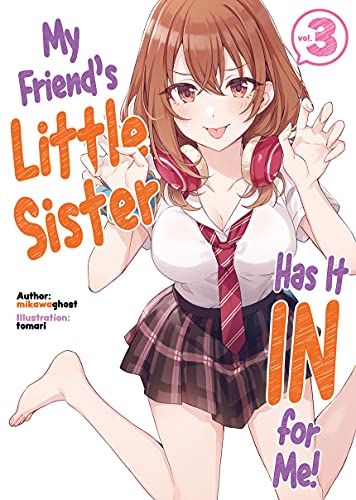By mikawaghost and tomari. Released in Japan as “Tomodachi no Imouto ga Ore ni dake Uzai” by GA Bunko. Released in North America by J-Novel Club. Translated by Alexandra Owen-Burns.
This is a flashback volume, as Akiteru explains to an increasingly despairing Mashiro exactly how he first met Iroha and started the game company. As such, as you can imagine, Mashiro barely appears in it, though she does get many of the funniest moments. Just as the “main” series ends each chapter with a conversation between Akiteru and Ozuma, this one ends them with a conversation between Akiteru and Mashiro… as Mashiro stares in disbelief at the fact that the boy she loves was starring in a wacky harem comedy long before she ever came back into his life. I’ve talked before about how the series seems to abuse her for the laughs, especially since she’s clearly not the winning girl, but there’s no denying it’s funny. Also funny are Akiteru’s deadpan reactions to all of this. Past or present, Akiteru is hopelessly, incurably earnest – and as the cliffhanger ending shows us, that may end up being his downfall in the long run.
As you might be able to tell by that cover, Iroha was not always the teasing girl in love with her sempai that she is today. Akiteru has become friends with Ozuma, which means he naturally meets his little sister as well. The siblings… don’t NOT get along, but definitely seem off – they barely interact with each other. Unfortunately, Akiteru also finds out that Iroha might be interested in joining a gang, and, because that’s the sort of person he is, resolves to try to stop this so she can stay on the straight and narrow. Things immediately go wrong when he runs into the gang’s leader… Otoi, who obviously has a deeper meaning to what she’s doing but finding out what that is will require more investigation… as well as pretending to be Otoi’s boyfriend.
The big surprise here might be that we meet a brand new supporting character, she plays a major role, and then we basically never see her again, as she does not appear in the main series. Asagi is a girl with major musical talent but comes from a very poor family, and being in Otoi’s “gang” allows her to be loaned an expensive guitar with which she can ply her trade on the streets busking. Her personality seems very familiar… deliberately, as it turns out, and she makes a nice contrast with Iroha, who is (rightly) very mistrustful of this friend of her brother’s who seems to be stalking her and far too invested in her life. That said, you can also clearly see why she falls for him – his earnestness is attractive as well as creepy, and also he’s basically found a way to make her dream come true (with the help of Otoi, who fills the deus ex machina role in this book handily). Iroha has genuine talent, and I think even her mother has to admit it.
The question is, will her mother destroy Akiteru’s dreams in order to advance her daughter’s? Stay tuned, because we’re caught up with Japan, and there’s no new volume there just yet.









